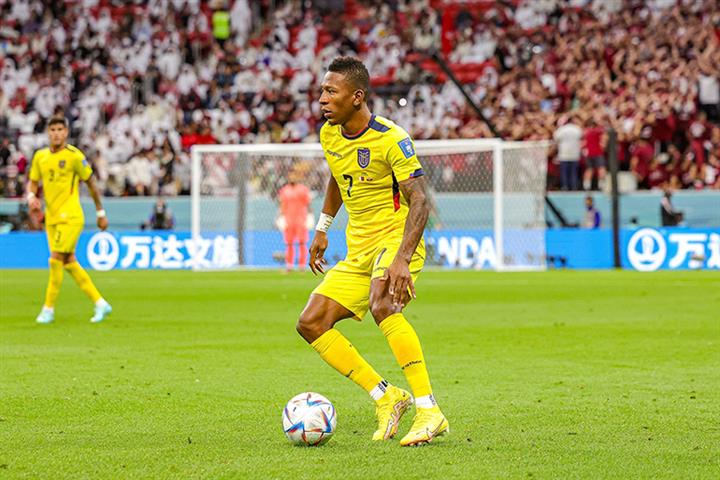 Most Qatar World Cup Sponsors, Suppliers Are Chinese
Most Qatar World Cup Sponsors, Suppliers Are Chinese(Yicai Global) Nov. 21 -- The 2022 World Cup kicked off in Qatar yesterday. During the opening game, Qatar versus Ecuador, fans worldwide could see the names of Chinese companies, the tournament’s largest group of sponsors and suppliers, on banners and pitch-side advertising signs.
The 22nd FIFA World Cup has 16 official sponsors and partners, of which six are Chinese. Dalian-based conglomerate Wanda Group, white goods giant Hisense Group, dairy products maker China Mengniu Dairy, and handset producer Vivo Communication Technology are global sponsors, while bike maker Yadea and recruitment platform Boss Zhipin are regional partners.
Sponsorship by Wanda, Hisense, Mengniu, and Vivo adds up to USD1.4 billion, exceeding the total USD1.1 billion offered by US companies.
“The World Cup is a perfect stage for ‘China-made’ products,” Li Jiang, managing director of Yutang Sports, a leading Chinese sports marketing firm, told Yicai Global.
Dairy products maker Yili Group, auto joint venture GAC Mitsubishi Motors, sports events organizer Wanda Sports, internet behemoth NetEase’s media arm NetEase Media Group, and lifestyle services platform Xiaohongshu signed sponsorship deals with national soccer teams participating in the World Cup. Mengniu, Yili, Chinese electronics maker TCL Technology, China Citic Bank, and mobile phone manufacturer Honor inked contracts with famous soccer players.
“The formation of Chinese companies into the largest group of sponsors of the World Cup 2022 in Qatar is not accidental, but a reflection of the Chinese manufacturing sector’s transformation toward the high-end from the previous low-end,” Li said.
The World Cup in Russia in 2018 attracted 36 Chinese sponsors, while this year’s tournament has only 20, Li added, noting that the sponsors of this year’s World Cup are all leaders in their sectors.
Three factors led to a decline in the number of Chinese sponsors, according to Li. First, the economic environment crimped the spending power of companies. Second, sponsorship costs are hard to recoup because of the difficulty in holding offline events because of Covid-19. Third, the event is being held in the northern hemisphere’s winter, so fewer fans will watch the games than in summer.
The Chinese men’s national soccer team did not qualify for the World Cup, but the country’s presence is still strongly felt and not just because of the great number of sponsors.
The Lusail Iconic Stadium, which will host the final match of the World Cup, was built by China Railway Construction Corporation with engineering machinery from China’s Sany Heavy Industry. Unilumin Group provided the light-emitting diode displays used at the venue. Chinese bus makers King Long and Yutong Bus supplied the new energy buses used during the tournament.
Chinese sponsors are indispensable, meaning Chinese supply chains are irreplaceable, said Zhou Nan, secretary general at the home appliance branch of the China Chamber of Commerce for Import and Export of Machinery and Electronic Products.
Sports, and soccer in particular, are the intercultural language of the world, Duan Chuanmin, a marketing professional, told Yicai Global. In just over a decade, Chinese firms have grown into mainstream participants in world-class sporting events, helping improve the image of both the companies and China itself, Duan added.
The pandemic has failed to stop Chinese companies going global with enthusiasm and confidence, a positive strength that is worth cherishing, Duan pointed out.
Editors: Zhang Yushuo, Futura Costaglione